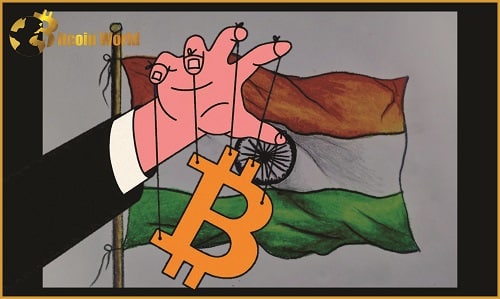The world of cryptocurrency in India is currently akin to navigating a maze in the dark. For Indian crypto enthusiasts and traders, the question isn’t just about market volatility anymore; it’s about the very legality and future of digital assets within the nation’s borders. The Indian government is in the midst of drafting cryptocurrency legislation, a move that holds the key to defining its long-term stance on this rapidly evolving financial frontier. But as the clock ticks, uncertainty continues to be the only constant.
What’s the Hold-Up in India’s Crypto Law?
If you’re following the crypto space in India, you’ve probably heard whispers of a proposed bill. Well, it’s not just whispers anymore. The Indian government is actively reconsidering aspects of this bill, hinting at potential revisions. Why the rethink? It seems to boil down to the need for broader consultation, especially given the ever-shifting global landscape of cryptocurrency regulations. Think of it like trying to hit a moving target – the rules of the crypto game are still being written globally, and India wants to ensure its approach is both effective and in sync with international standards.
This wider consultation also ties into comments made by India’s Prime Minister Narendra Modi at a virtual Summit for Democracy hosted by US President Joe Biden in December. Modi emphasized the necessity for global cooperation in shaping norms for emerging technologies, specifically mentioning cryptocurrencies and social media. His point? These powerful tools should empower democracy, not undermine it. This global perspective suggests that India isn’t just looking inwards when crafting its crypto policy; it’s considering the broader implications and seeking international alignment.
Lawmakers, according to media reports, are also closely examining the Reserve Bank of India’s (RBI) plan for a central bank digital currency (CBDC). This is a significant piece of the puzzle. The introduction of a CBDC could drastically alter the crypto landscape in India, potentially coexisting with or even influencing regulations around private cryptocurrencies like Bitcoin and Ethereum.
Why is the RBI Concerned?
The Reserve Bank of India (RBI) isn’t exactly waving the crypto flag with enthusiasm. They’ve voiced concerns, primarily focusing on the potential risks cryptocurrencies pose to financial stability and the overall macro-economy of India. Let’s break down these concerns:
- Financial Stability: Cryptocurrencies, with their price volatility and decentralized nature, can introduce instability into the financial system. The RBI, as the guardian of financial stability, is wary of these potential disruptions.
- Macro-economic Impact: Unregulated or poorly regulated cryptocurrencies could impact inflation, capital flows, and monetary policy effectiveness. The RBI needs to maintain control over these levers of the economy.
- Investor Protection: The crypto market is still largely unregulated, which means investors are exposed to risks like fraud, market manipulation, and lack of consumer protection. The RBI is concerned about safeguarding the interests of Indian investors.
It’s important to remember that the RBI’s caution stems from its mandate to protect the Indian financial system and the interests of its citizens. Their concerns are valid and need to be addressed in any regulatory framework.
Regulation or Ban – What’s India’s Crypto Future?
The million-dollar question, isn’t it? Will India embrace crypto with clear regulations, or will it opt for a complete ban? Current signals suggest the Indian government is leaning towards regulation rather than an outright ban. This is a positive sign for the Indian crypto community. However, there’s a tug-of-war happening. While the government seems open to regulation, the RBI is reportedly maintaining its stance against cryptocurrencies, potentially favoring a ban or highly restrictive measures. This difference in opinion is what’s likely causing the delays and the need for wider consultations.
Here’s a simplified look at the contrasting perspectives:
| Perspective | Stance on Cryptocurrency | Likely Approach |
|---|---|---|
| Indian Government (General Sentiment) | Inclined towards controlled adoption | Regulation, with potential restrictions |
| Reserve Bank of India (RBI) | Concerned about risks | Potentially favors a ban or stringent controls |
The final outcome will likely be a compromise, attempting to balance innovation and investor interest with financial stability and regulatory control. What this compromise will look like is still anyone’s guess.

Related Posts – Bank DBS’s Crypto Business Grows Massively Due To Growing Demand From Investors
What Does This Mean for Indian Crypto Traders?
For Indian crypto traders and investors, the current situation calls for caution and staying informed. Here are a few actionable insights:
- Stay Updated: Keep a close watch on news and developments related to crypto regulation in India. Reputable crypto news sources and financial publications are your best bet.
- Prepare for Volatility: Regulatory uncertainty often leads to market volatility. Be prepared for potential price swings in the crypto market.
- Diversify: Don’t put all your eggs in one basket. Diversification across different asset classes can help mitigate risks associated with regulatory changes.
- Understand the Risks: Educate yourself about the risks associated with cryptocurrency trading and investment, especially in a regulatory grey area.
In Conclusion: Navigating the Uncertainty
India’s cryptocurrency sector remains in a state of flux. The government’s ongoing deliberations and the RBI’s concerns highlight the complexities of regulating this nascent asset class. While the direction leans towards regulation, the specifics are still shrouded in uncertainty. For the Indian crypto community, patience, informed decision-making, and adaptability will be key as they navigate this evolving landscape. The final shape of India’s crypto regulations will not only determine the future of digital assets in the country but also send ripples across the global crypto ecosystem. The world is watching, and India’s crypto story is still being written.
Disclaimer: The information provided is not trading advice, Bitcoinworld.co.in holds no liability for any investments made based on the information provided on this page. We strongly recommend independent research and/or consultation with a qualified professional before making any investment decisions.




